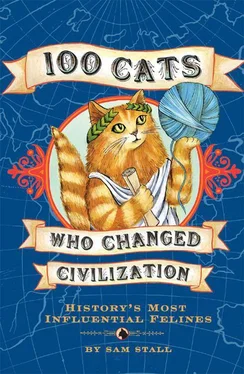The various controversies faded when Humphrey went to his final reward in March 2006. Happily, throughout his eventful tenure, the veteran mouser remained blissfully oblivious to it all.
BLACKIE
THE CAT WHO COULD TALK—AND SUE

U.S. law books are filled with groundbreaking civil rights cases. One of the most entertaining concerns a talented black cat from South Carolina. According to his owners, Carl and Elaine Miles, they acquired him at a rooming house in the late 1970s, when a girl with a box of kittens asked if they wanted one. “I said no, I didn’t want one,” Carl recalled during court testimony. “As I was walking away from the box of kittens, a voice spoke to me and said, ‘Take the black kitten.’ I took the black kitten, knowing nothing else unusual or nothing else strange about the black kitten.”
But things would soon get very unusual. A few months later Carl, inspired by what he called “the voice of God,” became convinced that the kitten was attempting to talk to him. So he tried to help the process by developing what amounted to a speech therapy program for cats. First he taped the sounds Blackie made, then played them back to him. He also encouraged his pet to watch his master’s lips as he spoke.
This effort paid off. The cat began, haltingly, to “talk” at six months. Shortly thereafter it could utter a grab bag of phrases clearly enough to become of interest to promoters. He talked (for a fee) on radio and television, and even made an appearance on the network program That’s Incredible .
But then the feline thespian’s fame subsided. By May 1981, the Mileses were reduced to exhibiting Blackie on the streets of Augusta, Georgia, where he would say things like “I want my mama” and “I love you” to passersby in exchange for handouts. Unfortunately, the local constabulary was less than charmed and insisted that the couple purchase a $50 business license. They complied, but then sued the city, stating that the law didn’t specifically mention talking animals. This was enough to make the case interesting. But then the Mileses went on to assert that the fee violated their right to free speech and association . Not just theirs, but Blackie’s too.
It was an interesting argument, to say the least, and one that might have eased the lives of noisy alley cats and chatty Siamese everywhere had the courts agreed with it. Unfortunately—though, perhaps, predictably—they didn’t. The couple lost their case in district court, which stated that even though Augusta’s business ordinance didn’t specifically mention talking animals, what the Mileses did was certainly a business, and therefore in need of a license.
The case was then kicked upstairs to the U.S. Court of Appeals for the Eleventh District. It, too, agreed that the couple needed to pay Augusta the contested $50. And in a footnote, the three-judge panel saw fit to address the issue of Blackie’s free speech rights, such as they were—or, in this case, weren’t. “The Court will not hear a claim that Blackie’s right to free speech has been infringed,” they said. “First, although Blackie arguably possesses a very unusual ability, he cannot be considered a ‘person’ and is therefore not protected by the Bill of Rights. Second, even if Blackie had such a right, we see no need for appellants to assert his right jus tertii [as a third party]. Blackie can clearly speak for himself.”
Thus ended the first attempt to gain free speech rights for cats. Not with a whimper, or even a meow, but with a quip.
CAT MANDU
THE FELINE WHO WAS A TRUE PARTY ANIMAL

Few jobs offer as many chances for personal embarrassment and career-destroying scandals as that of political party boss. That’s what makes the spotless career of one Cat Mandu of Great Britain so exemplary. For several years he helped lead a high-profile—albeit not very powerful—political organization. If there was trouble, he always landed on his feet. And if there was controversy, he knew how to keep his mouth shut.
Actually, he had little choice on that count. Because he couldn’t talk. Because he was a cat. Specifically, a large ginger tomcat owned by Alan Hope, who was also known as Howling Laud Hope.
What sort of organization would grant leadership to a feline? None other than the Official Monster Raving Loony Party. As one can surmise from the name, the group isn’t entirely serious. Founded in 1983 by musician David Sutch (a.k.a. Screaming Lord Sutch), it has offered candidates for numberless elections, from seats in Parliament to the lowliest local posts. Their platform has, at various times, included a call to abolish the income tax; to retrain police officers “too stupid” to do their jobs as vicars in the Church of England; and to require passports for pets. Ironically, this last idea was taken up by the actual political parties and adopted.
There’s little chance of them following the Loony’s decision to put an animal in charge, however. In 1999, after Screaming Lord Sutch’s suicide, the faithful gathered at the Golden Lion Hotel in Ashburton, Devon, to select a new leader. According to Loony lore, the vote produced a tie between acting chairman Howling Laud Hope and his pet. By general acclamation, he and Cat Mandu became joint leaders.
The feline performed his duties with distinction. He even produced the party’s 2001 political manifesto—a blank page. Sadly, his career was cut short when, in July 2002, he was run over by a car while crossing the street. Not that the feline flavor of the Official Monster Raving Loony Party has been totally expunged. In 1978, the organization had adopted the leopard as its official Party Animal, which it remains to this day.
SOCKS
THE UNOFFICIAL MASCOT OF THE CLINTON ADMINISTRATION

While plenty of U.S. presidents have brought along dogs during their White House tenures, only a handful deigned to keep cats. Bill Clinton joined that short list in 1993 when the family feline, Socks, accompanied the first family to Washington, D.C. It was the culmination of an incredible rags-to-riches story for the black and white mixed breed. Born in 1991, he spent his kittenhood living under the porch of Chelsea Clinton’s music teacher’s home in Little Rock, Arkansas. The teacher wasn’t able to get close to either Socks or his sibling, a kitten named Midnight. But when Chelsea saw the duo and approached them, Socks jumped into her arms.
Thus a media phenomenon was born. Midnight also found a good home, but Socks won worldwide fame. First he lived in the governor’s mansion. Then, after Clinton’s election to the presidency, the Arkansas tomcat moved to the White House. Instead of crouching under a porch, he spent his days lazing in the garden outside the Oval Office or napping in a favorite chair in the West Wing. He also made numerous public appearances, often traveling in a cat carrier fitted with the presidential seal.
Not that life in a media fishbowl was always perfect. Photographers swarmed Socks, sometimes bribing him with catnip. After it was deemed too dangerous to give him free run of the White House grounds, he was confined to a very long leash. But those inconveniences paled in comparison to his longstanding quarrel with the “first dog,” a purebred Labrador retriever named Buddy. According to Hillary Clinton, Socks hated the exuberant canine “instantly and forever.” The two did, however, bury the hatchet long enough to pose for the cover of a book called Dear Socks, Dear Buddy: Kids’ Letters to the First Pets .
Читать дальше













